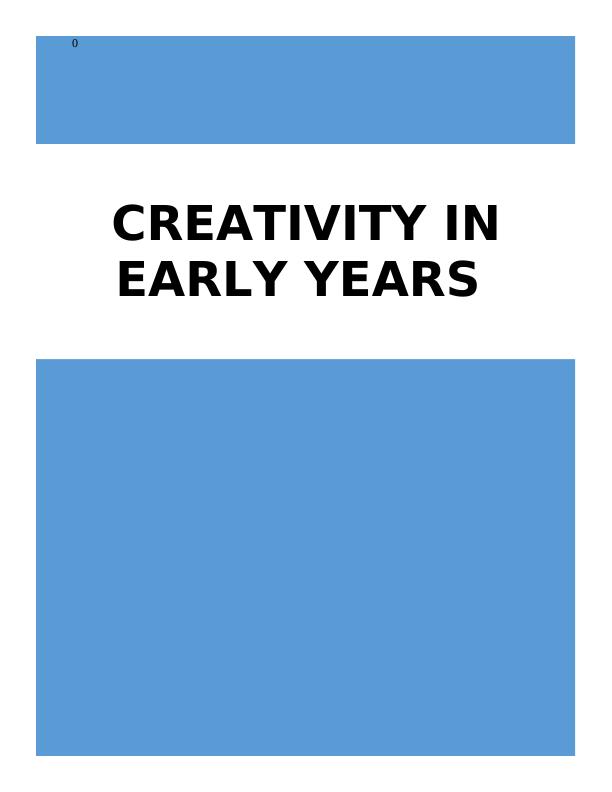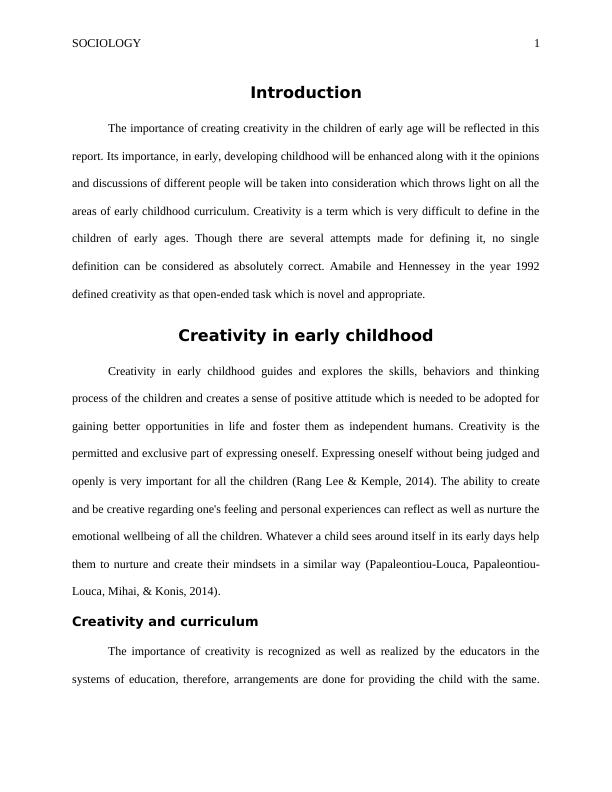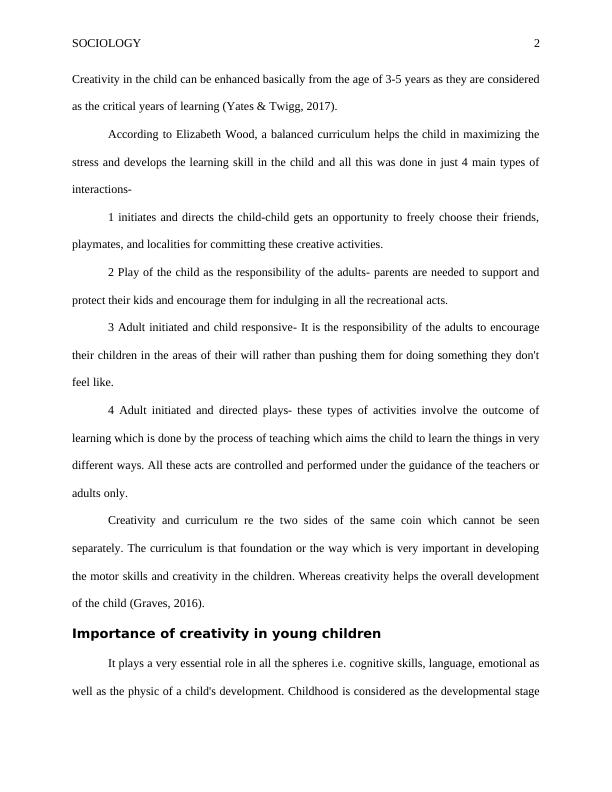Creativity in Early Years
Added on 2022-11-30
10 Pages2510 Words327 Views
CREATIVITY IN
EARLY YEARS
0
EARLY YEARS
0

SOCIOLOGY 1
Introduction
The importance of creating creativity in the children of early age will be reflected in this
report. Its importance, in early, developing childhood will be enhanced along with it the opinions
and discussions of different people will be taken into consideration which throws light on all the
areas of early childhood curriculum. Creativity is a term which is very difficult to define in the
children of early ages. Though there are several attempts made for defining it, no single
definition can be considered as absolutely correct. Amabile and Hennessey in the year 1992
defined creativity as that open-ended task which is novel and appropriate.
Creativity in early childhood
Creativity in early childhood guides and explores the skills, behaviors and thinking
process of the children and creates a sense of positive attitude which is needed to be adopted for
gaining better opportunities in life and foster them as independent humans. Creativity is the
permitted and exclusive part of expressing oneself. Expressing oneself without being judged and
openly is very important for all the children (Rang Lee & Kemple, 2014). The ability to create
and be creative regarding one's feeling and personal experiences can reflect as well as nurture the
emotional wellbeing of all the children. Whatever a child sees around itself in its early days help
them to nurture and create their mindsets in a similar way (Papaleontiou-Louca, Papaleontiou-
Louca, Mihai, & Konis, 2014).
Creativity and curriculum
The importance of creativity is recognized as well as realized by the educators in the
systems of education, therefore, arrangements are done for providing the child with the same.
Introduction
The importance of creating creativity in the children of early age will be reflected in this
report. Its importance, in early, developing childhood will be enhanced along with it the opinions
and discussions of different people will be taken into consideration which throws light on all the
areas of early childhood curriculum. Creativity is a term which is very difficult to define in the
children of early ages. Though there are several attempts made for defining it, no single
definition can be considered as absolutely correct. Amabile and Hennessey in the year 1992
defined creativity as that open-ended task which is novel and appropriate.
Creativity in early childhood
Creativity in early childhood guides and explores the skills, behaviors and thinking
process of the children and creates a sense of positive attitude which is needed to be adopted for
gaining better opportunities in life and foster them as independent humans. Creativity is the
permitted and exclusive part of expressing oneself. Expressing oneself without being judged and
openly is very important for all the children (Rang Lee & Kemple, 2014). The ability to create
and be creative regarding one's feeling and personal experiences can reflect as well as nurture the
emotional wellbeing of all the children. Whatever a child sees around itself in its early days help
them to nurture and create their mindsets in a similar way (Papaleontiou-Louca, Papaleontiou-
Louca, Mihai, & Konis, 2014).
Creativity and curriculum
The importance of creativity is recognized as well as realized by the educators in the
systems of education, therefore, arrangements are done for providing the child with the same.

SOCIOLOGY 2
Creativity in the child can be enhanced basically from the age of 3-5 years as they are considered
as the critical years of learning (Yates & Twigg, 2017).
According to Elizabeth Wood, a balanced curriculum helps the child in maximizing the
stress and develops the learning skill in the child and all this was done in just 4 main types of
interactions-
1 initiates and directs the child-child gets an opportunity to freely choose their friends,
playmates, and localities for committing these creative activities.
2 Play of the child as the responsibility of the adults- parents are needed to support and
protect their kids and encourage them for indulging in all the recreational acts.
3 Adult initiated and child responsive- It is the responsibility of the adults to encourage
their children in the areas of their will rather than pushing them for doing something they don't
feel like.
4 Adult initiated and directed plays- these types of activities involve the outcome of
learning which is done by the process of teaching which aims the child to learn the things in very
different ways. All these acts are controlled and performed under the guidance of the teachers or
adults only.
Creativity and curriculum re the two sides of the same coin which cannot be seen
separately. The curriculum is that foundation or the way which is very important in developing
the motor skills and creativity in the children. Whereas creativity helps the overall development
of the child (Graves, 2016).
Importance of creativity in young children
It plays a very essential role in all the spheres i.e. cognitive skills, language, emotional as
well as the physic of a child's development. Childhood is considered as the developmental stage
Creativity in the child can be enhanced basically from the age of 3-5 years as they are considered
as the critical years of learning (Yates & Twigg, 2017).
According to Elizabeth Wood, a balanced curriculum helps the child in maximizing the
stress and develops the learning skill in the child and all this was done in just 4 main types of
interactions-
1 initiates and directs the child-child gets an opportunity to freely choose their friends,
playmates, and localities for committing these creative activities.
2 Play of the child as the responsibility of the adults- parents are needed to support and
protect their kids and encourage them for indulging in all the recreational acts.
3 Adult initiated and child responsive- It is the responsibility of the adults to encourage
their children in the areas of their will rather than pushing them for doing something they don't
feel like.
4 Adult initiated and directed plays- these types of activities involve the outcome of
learning which is done by the process of teaching which aims the child to learn the things in very
different ways. All these acts are controlled and performed under the guidance of the teachers or
adults only.
Creativity and curriculum re the two sides of the same coin which cannot be seen
separately. The curriculum is that foundation or the way which is very important in developing
the motor skills and creativity in the children. Whereas creativity helps the overall development
of the child (Graves, 2016).
Importance of creativity in young children
It plays a very essential role in all the spheres i.e. cognitive skills, language, emotional as
well as the physic of a child's development. Childhood is considered as the developmental stage

End of preview
Want to access all the pages? Upload your documents or become a member.
Related Documents
Personal Philosophy of Early Childhood Educationlg...
|5
|815
|77
Design and Implement Curriculum for Children's Learning and Developmentlg...
|49
|10520
|372
Children's Learning Perspectiveslg...
|8
|2239
|91
Early Childhood Development Plan - Doclg...
|15
|2531
|101
Concept of Creativity | Early Childhood Education and Carelg...
|4
|1025
|20
Effect of Playing Building Blocks in Early Childhood Developmentlg...
|10
|2554
|20
